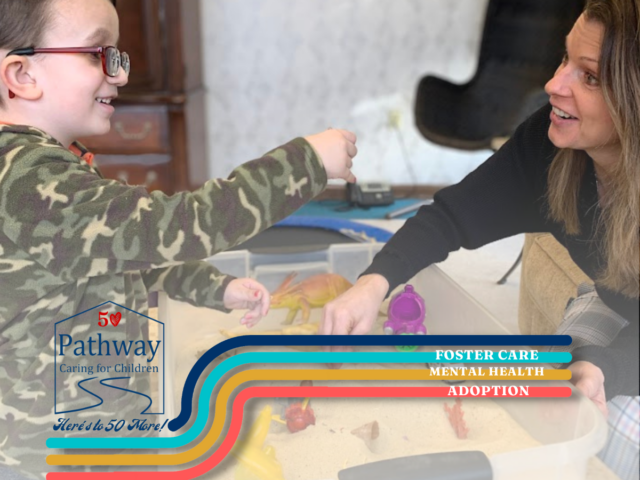
FAQs: Counseling for Kids
1. What is counseling for children?
Counseling for children is a type of therapy that helps children and teens work through emotional, behavioral, or mental health issues with the help of a licensed mental health professional.
2. What types of problems can counseling for children help with?
Pathway can assist children and families with a wide range of challenges, such as:
- ADHD (Attention Deficit Hyperactivity Disorder
- Adjustment to life changes/relationship issues
- Adoption-specific issues
- Anger management
- Autism Disorder and/or developmental disorders
- Attachment difficulties
- Behavioral issues
- Depression and anxiety disorders
- Divorce issues
- Family issues
- Grief and loss
- Post Traumatic Stress Disorder (PTSD)
- Social/Peer relationships
- Stresses related to everyday life
- Trauma
3. How do I know if my child needs counseling?
Signs that your child may benefit from counseling include changes in behavior or mood, difficulty with school or social interactions, and ongoing physical complaints with no medical explanation.
4. How do I find a counselor for my child?
You can find a counselor for your child by asking for referrals from your child’s doctor or school, searching online directories, or contacting your insurance provider for a list of in-network providers. Meet Pathway Therapists HERE: https://www.pathwaycfc.org/mental-health-services/meet-our-therapists/
5. What qualifications do child counselors have?
Counselors and therapists typically have a master’s degree in counseling, social work, or a related field, as well as a state license or certification. They may also have additional training or certifications.
6. What should I expect during my child’s first counseling session?
During your child’s first counseling session, the therapist will talk with you and your child about the reasons for seeking counseling and gather information about your child’s background and current issues. Children are offered a snack, water, and a safe non-judgmental space whether this be at school, a community center, or in a trauma-informed therapist’s welcoming office. Activities, creative outlets, and skill building each help promote conversation and form trust between therapist and child or family.
7. Can parents be involved in their child’s counseling sessions?
Yes, parents can be involved in their child’s counseling sessions, depending on the child’s age and the type of counseling being provided.
8. How long does counseling for children usually last?
The length of counseling for children varies depending on the child’s needs and goals. Some children may benefit from just a few sessions, while others may continue therapy for several months or years.
9. What if my child doesn’t want to go to counseling?
It’s important to talk with your child about the benefits of counseling and address any concerns they may have. If your child is still resistant, you can consider involving them in the process of finding a counselor and allowing them to choose a therapist they feel comfortable with.
10. What is trauma-informed counseling?
Pathway is a trauma-informed agency. All our staff receive training to understand trauma and its impact on individuals–not just clients but also on all of us as staff. Trauma-informed counseling aims to help individuals process and heal from their past experiences, improve their mental health and well-being, and empower them to move forward in their lives with a greater sense of resilience and control.
We are ready to help! Call 330-493-0083 or email [email protected] to schedule an assessment and session.